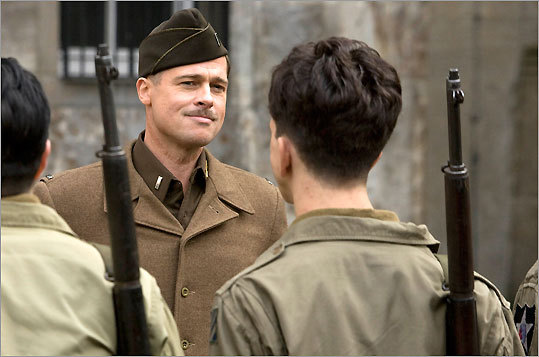
Following on the heels of the strong opening weekend for the relatively intelligent alien invasion story District 9, Quentin Tarantino’s World War II adventure Inglourious Basterds opened at number one at the U.S. movie box office this past weekend, taking in $37.6 million.
That’s the most, by far, any Tarantino film has brought in during its first three days, greatly outpacing the $25 million for Kill Bill, Volume 2. Coming in second on the week was District 9, last week’s top attraction, with just under $19 million.
While those aren’t quite G.I. Joe/Transformer numbers, they’re definitely solid and suggest that audiences are looking for more than superficial thrills as the young ones head back to school. Even though Inglourious Basterds manifests Tarantino’s stylistic self-indulgence and evidently vastly greater interest in movies than in reality, the film does have a real story line and more interesting characters than the great majority of summer blockbuster contenders.
Joining Basterds and District 9 in the weekend’s top five were two strongly character- and story-driven films, The Time Traveler’s Wife and Julie and Julia. G.I. Joe: The Rise of Cobra fell to third with an unspectacular $12.5 million.
Although Tarantino provides plenty of sensational and bizarre scenes in his films, they typically include vivid, interesting characters, occasionally clever dialogue, and strong story lines–while adhering to the contemporary cinema’s cavalier attitude toward both logical and psychological plausibility, its preference for the sensational over the sensible, its penchant for bad taste, its admiration for personal wilfullness, and its advocacy of hedonistic utilitarianism.
Meaning: the strengths of Tarantino’s films lie in their similarity to the best of modern American dramatic series television, while his weaknesses are those of the contemporary Hollywood cinema.
–S. T. Karnick

It looks like September’s starting early, what with these more-meaty films getting good B.O. berths. G.I. Joe seems to be the only August popcorn dump.
As for Tarantino, his cinematic outlook seems increasingly refreshing, in spite of the vulgarity. His embrace of pulp tropes is a welcome antidote to the notion that only NYT bestseller and ivory tower seal of approval material is good and worthy. It also hints that’s there’s a whole heritage slowly being wallpapered over by PC high school reading lists and a vibrancy to humanity not captured in them.